- Home
- Mark Zubro
Dying to Play Page 18
Dying to Play Read online
Page 18
Brandon Saldovi, the young player, stood next to me. I pointed above my head where I’d opened the emergency door. “The bus might catch fire. Let’s get a couple guys outside and then pass the victims up to them.” The broken bus windows on the side of the bus were about large enough for an average size third grader to crawl through, too small for us.
Saldovi and I got the conscious ones nearest to us to help. Four of them got out. Saldovi stayed down with me. He helped me hoist guys up. Campbell was one of the first. I saw he was breathing. It is not easy lifting a two-hundred pound person up through an emergency door, but in moments he was out. He got tipped over the side and eased to the ground. I turned to help the next person.
As we both hefted the two hundred fifty pound catcher on our shoulders, Saldovi said, “I never thought I’d be this close to such a big butt.” Grime covered the left side of Saldovi’s cheek. He had a smear of blood on the top of his nose. He grimaced through his sweat. Then the catcher was up and out. We reached for the next guy.
When I had a second to glance, I saw cars pulling over, pointing their headlights in our direction, and people hurrying through the darkness toward us. I also noted the approach of several sets of emergency lights. It was easier getting guys out through our opening than the back. That opening was just too narrow, although someone continued to bang on it with a baseball bat from the inside. As we passed the guys upward, we braced their necks as best we could. As we moved to the ones farthest from the exit, we had to walk bent over on top of the windows and around the seats.
Ralph Olsen, who had been in the motel room with Malcolm Dowley, was bellowing and crying. Two ends of a broken bone were sticking out of his left arm. When we tried to lift him, he banged his arm on the side, which was now the roof, of the bus. He bellowed again and then fainted. We got him out and moved to the next person.
Guys who were waiting for the aisle we were using to clear had been using bats to lever the twisted metal in the front farther apart. They’d had little success so far.
I saw a fire truck pull up and men rushed to position hoses. Perhaps they’d be in time to stop the fire from spreading and consuming us and the bus. The thought of getting out while it was safe and leaving these guys flickered through my consciousness, but that wasn’t an option.
Some of the players began hurling equipment and personal belongings out. I didn’t think this was the brightest thing at the moment. I shouted, “Forget that shit. Help us with these guys then get the fuck out.”
One of the people outside shouted, “There’s gas leaking all over the place! We gotta get all of you guys out of there.” After the last few unconscious guys were out, the rest of the guys scrambled through the opening. After all the others were safe, Saldovi and I did a last check for any unconscious teammates.
I realized I hadn’t seen the bus driver. I hustled up to the front. He was wedged almost out of sight. I didn’t think Henry had moved since the crash. The steering wheel had shattered. A six inch chunk of it protruded out from the left side of his chest. Blood burbled out of the wound. He was breathing. I heard Trader Smith yell, “Get the hell out of there.”
The bus was dark with dim shadows cast by emergency lights. I glanced outside. Flames flickered near the back door. Jamie McDaniels dropped through the emergency door back into the bus. He joined Saldovi and me.
Over the noise of sirens, fire, and humans McDaniels shouted, “We can’t let him burn to death.”
I unbuckled Henry’s seat belt. Fortunately, he was not gifted with the girth so many Hollywood clichés seemed to think bus drivers called for. I didn’t waste time trying to decide to pull out the chunk of metal from his chest. Medical people would have to deal with that. I wrapped my shirt around the protuberance as best I could to stabilize it. McDaniels and I were standing in the well the steps made.
Voices shouted. “Get the hell out of there! Move!”
I twisted so that my hands were on the railing over the first seat. I swung my feet and kicked at the twisted metal blocking our exit. Remnants of glass in the front window crunched and fell. I kicked again and the remaining bits of safety glass crackled with spider webs. I swung and thrust and pounded with my feet. Wisps of smoke drifted by. It was getting harder to breathe.
Outside, I saw Malcolm Dowley run toward the mass of twisted metal with a baseball bat in his hand. Smith was a step or two behind him with two more bats. He tossed one to Clem Vickers.
We could hear more shouts and calls of “Hurry. Get out.”
I continued to swing and kick with every ounce of strength I had. Dowley organized three of them so their bats were prying the metal out at the same time in the same direction. Seconds later metal screeched, came loose, the rest of the window fell in a thousand shards, and the metal parted and swung outward.
I was facing the rear as Saldovi, McDaniels, and I freed Henry and lifted him out. Bright flames leaped around the outside back half of the bus. Hands reached out and pulled the driver through the opening. I shouted, “Watch his chest!”
Dowley saw the wound. He placed a hand around the shirt I’d used as a bandage. They rushed Henry away. Saldovi swung himself out like a trapeze artist. I shoved Jamie McDaniels out ahead of me. He landed on his hands on the ground. I jumped, tottered, righted myself with my hands. I felt the rush of heat behind me. Hands yanked me away from the bus.
There wasn’t one big explosion. It was more of a whoosh as the fumes from the gasoline that had spilled went up. The tank must have been closer to empty than full because it gave only a minor woof and whoosh.
FRIDAY 2:49 A.M.
We got uniforms and towels and jackets and shirts and anything else we could find to cover the wounded. While the night was still and humid, those going into shock needed to be kept warm.
I remembered hunting for Donny as I helped, but he’d been one of the first ones out. By now ambulances were being filled and rushing away. He might have been among the first to be transported.
A paramedic bandaged cuts on my left wrist and left ankle and checked for a concussion. I had a purple bruise along my abdomen where the seat belt had kept me from more serious injury. My bones felt as if a giant had picked me up and thought I must be his own personal Raggedy Ann doll that needed a good shaking.
Emergency sirens and human moans filled the night. Olsen was awake and screaming.
I spent the time checking people and seeing who was hurt. Some stood around in a daze. I found the guys who helped at the end with making an opening in the front and getting Henry and the rest of us out. I thanked each one.
I found Donny Campbell propped up against a tree stump about fifty yards from the bus. He was awake and breathing normally. As I approached, a person with a medical badge on leaned over Donny and said, “You were lucky.” I sat down next to my wounded friend and put an arm around his shoulder. Sweat and grit lined his face. His hair stuck up wildly in some places and was matted down with blood in others. His jeans were shredded and torn. One shoe was missing. “How are you?” I asked.
“I only woke up a few minutes ago. That guy who was just here said I was okay. The last thing I remember is your arm pressing on my chest. You saved me.”
“We were both lucky. We got everybody out in time. Do you want to lie down?”
“I don’t get as dizzy if I’m sitting up. Does anybody know what happened?”
“Not that I heard.”
“I wonder if Henry fell asleep. He’s usually so hopped up on caffeine, he’s hard to shut up.”
“Nobody’s said anything yet.”
Cops and paramedics worked the scene with what I thought was efficiency and aplomb. They were professional and kind. Many of the emergency vehicles said Albert Lea on the side. I learned later that was the nearest town.
Of the wounded I’d seen, Henry, the bus driver, was the most seriously hurt. A helicopter rushed Henry away.
Lights from cars, spotlights, one from another helicopter, gave an eerie glow to the scene. I co
uld have done without the helicopter noise, but they were trying to help. Faces would go in and out of the light. Most of the guys were pale.
Strangers, passing motorists I supposed, were moving among us, comforting people, doing what they could, bringing blankets from their cars. Some started offering food. Several teenage girls showed up with cookies and coffee. We found out later they were from nearby farms.
I found a Mustangs T-shirt to replace the one I’d used on Henry’s wound. The adrenalin was wearing off, and the possibility that I, along with a bunch of the others, could have been killed, thundered in my brain. I felt myself getting a little shaky. Bunches of equipment were scattered around the cornfield we occupied. The outside compartments must have come open in the crash. I didn’t see my duffel bag. I didn’t care enough to look.
As the more seriously hurt were taken away, those of us who were mobile and had been seen to, began to gather about two hundred feet from the bus. Donny and I stood on the fringe of the group. We leaned heavily on each other. I didn’t break the contact. Human closeness felt right.
I used my cell phone to call Duncan.
“You sure you’re all right?” he asked several times.
I told him I was.
“Do you want any of us up there?” he asked.
“I presume we’re turning around and coming back.”
A yellow school bus drove up. The female driver opened the door. We shuffled in. People fell into seats. Nobody said much. They took us down the interstate to the next exit. They packed us into a chain motel. The coffee shop across the parking lot was open. Several of us trooped in. A few guys had pieces of pie. Donny had a soft drink. I had water.
None of us had changed. I had blood on my jeans and shoes. Swaths of dirt mixed with minor bits of blood on my abraded left arm. After people ate, we shuffled to our rooms.
Everybody had to share. I was with Donny. As soon as the door closed, we were in each other’s arms. We clutched each other passionately, our chests, hips, and legs mashing and entwining. He whispered in my ear. “We’re alive.” And that’s all we said as our lips met and tongues swirled together.
The resolve I had got swept away in the relief of being alive and having someone warm next to me. We weren’t lovers, but I hadn’t lost him.
Although I was exhausted from the adrenalin rush and the physical exertion at the accident scene and from making love, I had trouble falling asleep. In a few minutes I heard Donny’s breathing turn regular.
Lying there awake, mostly I brooded about the accident. Flashes of the crash, the fire, helping guys, and the realization that I’d been lucky kept me awake long past tired. Was it even an accident? If it was deliberate, I wondered if when I caught whoever did it, if I’d be able to control my own anger.
And if deliberate, who? From which faction of idiocy in town would someone be this desperate? Or was it a random insane killer? My mind whirled searching for answers. I shook my head and snuggled closer to Donny. As I noticed the first light of dawn, I finally nodded off.
I woke with Donny next to me. It felt good. A shower revived me a little. Donny had his traveling bag. I wore a pair of his underwear and a fresh T-shirt. They were a little big on me. I didn’t mind.
FRIDAY 10:10 A.M.
There was no news on Henry’s condition. Word spread that the equipment and personal effects that escaped the crash and the fire were gathered in a high school gym two blocks away. A little after ten a bunch of us trooped down. After twenty minutes I found my duffel bag. This isn’t as much of a minor miracle as it might seem. Not all that much stuff survived the accident.
It was scorched around the edges but the plastic containers and stuff inside, such as deodorant, had neither melted nor congealed. I checked all the little side pockets where Duncan usually crammed stuff. I found a phone and a flash drive that weren’t mine.
These two bits of electronic detritus were intact. Where did they come from? Were they placed there before we started the trip by Duncan? After the fire? Or hell, five minutes before we walked into this small gymnasium? By whom? And why?
I pressed the on button on the phone, but I couldn’t use it. It was password protected. I wanted to examine these two items at my leisure, but would their presence on my person be a clue or implicate me in something? I slipped them into my pocket.
Finished looking for stuff, the guys began to gather in the coffee shop we’d been in the night before.
About ten of us put together five tables so there’d be room for us and more if anyone showed up. Donny sat next to me. His leg touched mine. I liked it there.
The waitress told us the meal was on the owner. A steady stream of townspeople brought in cookies, brownies, pies, and cakes. By the time they were done it looked like they had enough food to stock a bakery for a year.
When we were all settled, Malcolm Dowley asked, “Anybody heard what caused it?”
Jamie McDaniels said, “We had the oldest possible kind of bus. The hardest to get out of. We were all almost killed because Connor Knecht was too cheap to get us a decent bus. A goddamn new stadium and he can’t afford a decent bus! Anybody try to use the john in that thing? It was filthy. The least they could have done was cleaned it, and I had to push the handle three times to get it to flush properly. Knecht hired a college kid to drive us? How cheap is that? Maybe if we’d had a professional driver, we wouldn’t be in this mess.”
Dowley said, “We don’t know if it was Henry’s fault or not, or if it’s because we had a fucking lousy bus. If they can prove negligence on Knecht’s part, all of us could probably sue him.”
Trader Smith walked in. He looked like he hadn’t slept. He stumbled over to us and sat down. He wiped his hand across his face. He said, “I just heard. Henry didn’t make it.”
Exclamations of dismay and woe filled the air. They talked about Henry for quite a while. They all liked him. They called him professor because he read books. They repeated some of his stupidest jokes.
A wrinkled old man who must have been in his nineties tottered into the diner. He supported himself with a cane as he shuffled to a table.
“What’s going to happen to us?” Dowley asked.
Smith said, “The games this weekend are cancelled. We’ll have a brand new bus here this afternoon. We’ll be going directly back to Butterfield. We’ll make provisions for anybody who wants to attend the wake and the funeral.”
I asked, “What caused the accident?”
Smith said, “Nobody knows for sure.”
Brandon Saldovi walked in. He saw us and hurried over. He pointed at Smith and me, “Mr. Knecht wants to see you.”
“What’s up?” I asked.
“I dunno,” the kid said. “He’s talking to the cops in a conference room in the motel.” Trader Smith got up. I followed him.
As I passed the booth where the old man sat blowing on his spoonful of soup, he glanced at me and nodded. He reached out a withered, splotched hand, and in Georgia’s huskiest whisper, said, “I’m here if you need me.”
I patted the hand and said, “You’re most kind to think of us.”
In the conference room in the hotel across the parking lot were two state cops in uniform, two gentlemen in suits, and a well dressed woman. She was Alice Ginetti, the mayor of the town.
She was asking, “Is there anything else we can do for you?”
“You’ve been most kind,” Knecht said. “We’ll let you know.”
I found out later that Knecht had rushed to the scene as soon as he got the news.
Smith and I were introduced. The fact that I was a private eye was mentioned. The cops didn’t comment about that bit of news. Spike Dermer was the Minnesota state cop in charge of the investigation. He was in his fifties with white hair cut short and a trim figure. He said, “We want to discuss what happened last night.”
Knecht said, “Henry was a very responsible young man. He was highly recommended. We hadn’t had the slightest problem with him. He was always on time. He
kept the speed limit. He never caused any trouble. I can’t imagine him falling asleep at the wheel.”
Dermer said, “Our preliminary investigation indicates that he probably didn’t.”
I felt my heart begin to beat a bit faster. I leaned forward.
“What do you mean?” Knecht asked.
“The engine had been shut off. The emergency brake had been pulled. He tried everything he could to stop the bus when the brakes didn’t.”
“The brakes failed!” Knecht interjected.
Dermer said, “Somebody sabotaged them.”
Moments of stunned silence and looking back and forth at each other with Smith murmuring, “Someone was trying to kill us all?”
Dermer said, “Someone was certainly trying to cause harm.”
Knecht asked, “How is that possible?”
Dermer said, “Doesn’t take much and it doesn’t take long. Somebody crouches down behind the wheel, cuts the brake cable, the fluid leaks out, and the brakes fail.”
“Why wouldn’t the fluid just leak out when the killer cut the line?” Knecht asked.
“You make a small cut. It can take a while.”
I said, “So the killer was taking a chance that the leak could show up before we even left, or while the bus was stopped, but he was hoping it happened while we were rushing down an interstate? Why wouldn’t the ‘check brake’ light in the display panel go on?”
“It isn’t working now,” Dermer said. “When it stopped working is anyone’s guess. If the driver knew it was out and continued anyway, that could be negligence. Although with him dead, we may never know. When was the last maintenance on the bus?”
“It’s regularly inspected and tuned up,” Knecht said.
Dermer said, “I’ll need to see the reports, receipts, and all other documentation on that. It could be negligence. It could be attempted mass murder. With the driver’s death this is now a homicide.”
Knecht gave the full story on everything that had happened to the stadium, the threats, and the reason for my being hired.

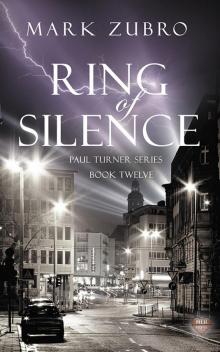 Ring of Silence
Ring of Silence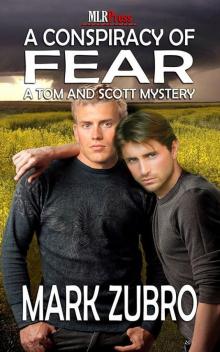 A Conspiracy of Fear
A Conspiracy of Fear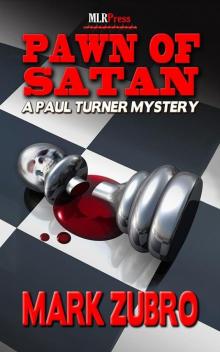 Pawn of Satan
Pawn of Satan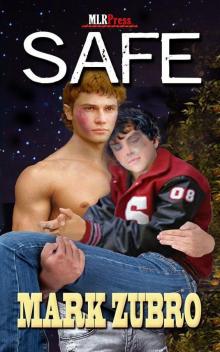 Safe
Safe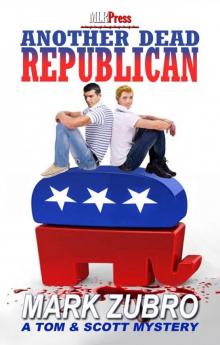 Another Dead Republican
Another Dead Republican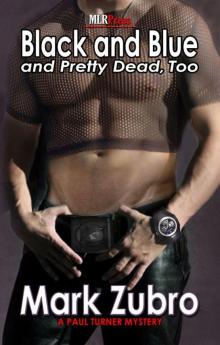 Black and Blue and Pretty Dead, Too
Black and Blue and Pretty Dead, Too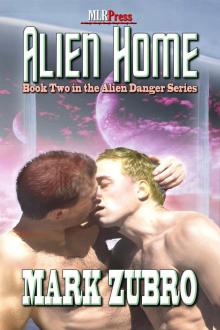 Alien Home
Alien Home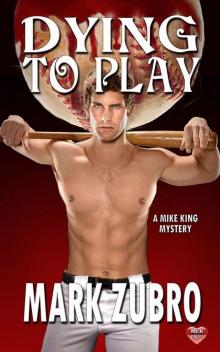 Dying to Play
Dying to Play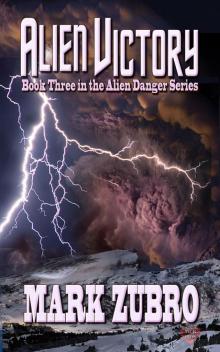 Alien Victory
Alien Victory